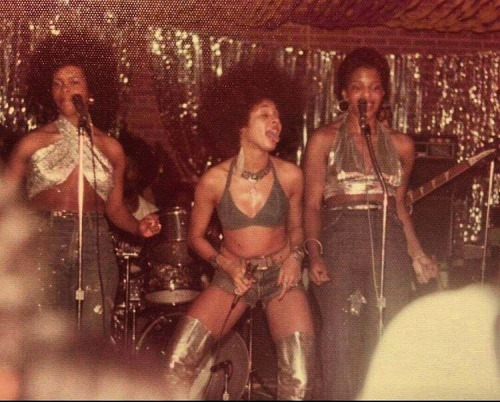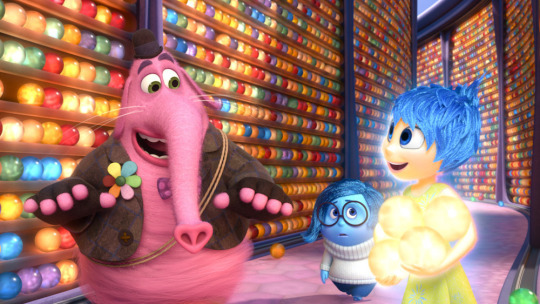Charlie Jane Anders's Blog, page 31
August 4, 2016
Come see me at WorldCon!

Worldcon is coming up, and I’m on a few panels this time. And they’re all on topics that I’m super excited to talk about for an hour. Alongside people I’m stoked to be on panels with. Come say hi!
Why I Write Short StoriesThursday 15:00 - 16:00, 2504B (Kansas City Convention Center)
Most authors agree that short stories don’t pay the bills, but
authors who are known for writing novels frequently turn their attention
to the shorter forms. If it isn’t for the money, why do they spend
their time and energy writing short stories?
James Patrick Kelly (M), Mary Robinette Kowal, David D. Levine, Mr. Bishop O'Connell, Charlie Jane Anders
Is Artificial Intelligence Dangerous?Friday 15:00 - 16:00, 2505B (Costume) (Kansas City Convention Center)
“Giant Robot Menace!” “Soulless Machine Decides Humanity Is
Obsolete!” These aren’t the headlines of the future, they’re the
headlines from the past. Join us as we question whether artificial
intelligence is dangerous and whether its benefits outweigh the threat
to humanity.
Megan O'Keefe, John Popham (M), Gary Kloster, Sarah Frost, Charlie Jane Anders
Writing The Near FutureFriday 16:00 - 17:00, 2206 (Kansas City Convention Center)
What are some of the specific challenges associated with writing about the day after tomorrow
(or thereabouts)? Our authors consider how to alter the world just that
little bit, how to keep their readers believing, and what happens when
time catches up with their writing…
Eileen Gunn, Laurie Mann, Howard Davidson, Scott H. Andrews (M), Sarah Pinsker, Charlie Jane Anders
August 1, 2016
doomandgloomfromthetomb:
Betty Davis - Riviera ‘76 Festival...

Y’all, I wrote up that new Light in the Attic release of the oft-rumored late 60s Betty Davis sessions over on Aquarium Drunkard. The tunes (including Cream and CCR covers) feature an array of Miles Davis sidemen (not to mention a few helpful comments from Miles himself). Like I say over on AD, it’s not quite a masterpiece, but if you enjoy Ms. Davis’ stuff you obviously want to hear it.
As far as I know, there’s not too much unreleased Betty Davis still in existence – but there is this audience tape of a French festival gig. Even though I don’t think there are any other examples of Betty onstage, judging from the sound of this one, she (and her very funky band) could bring it. Very nasty, naturally.
July 27, 2016
I created a YouTube playlist for my DJ sets! Once a year, I DJ...
I created a YouTube playlist for my DJ sets!
Once a year, I DJ at the Floomp, which is a queer dance party at WisCon, the feminist science fiction convention in Madison, WI. My DJ style boils down to:
1/3 old-school funk/hip hop
1/3 mash-ups
1/3 K-Pop and J-Pop
Plus assorted other stuff here and there.
I love the mix of those three things – for some reason, they seem to go really well together. The super dancy mash-ups have a lot of beats that mesh with the K-Pop, and then the old-school just pumps it up some more. I created this YouTube playlist a while back, to kind of represent the stuff I spin, and a couple of the videos have already been taken down. So I figured I should post it ASAP!
Some notes follow.
EARLY CHILL/INSTRUMENTAL SET: I often try to start off with some instrumentals that are a bit more chill. The J.B.’s Reunion CD is totally worth getting, and “Mistakes and All” is a standout track featuring Bootsy Collins. Gang do Tagarela’s instrumental version of “Rappers Delight”/”Good Times” is utterly brilliant – it’s on the Black Rio CD and it blew my mind the first time I heard it. Then things get a bit more R&B with Tasha Taylor’s fantastic “Wonder Woman” and “Getaway” by N’Dea Davenport from the Brand New Heavies. Those totally started the party off right once or twice at the Floomp.
Other songs worth noting:
Deep Dickollective/We Out – this queer hip hop group, starring my friend Juba Kalamka, was absolutely incredible, and their stuff is easy to find online now.
Mighty Mike/Crazy Time to Relax and Beyonce/Formation – I love the way this mashup flows into Beyonce’s song. I didn’t ever play the Mighty Mike mashup in the same set as Gang do Tagarela, since that’s a LOT of “Good Times.”
Hyuna/Ice Cream & Roll Deep – I love Hyuna Kim, and always have to play at least one of her songs. Her videos are super hypnotic too.
En Vogue/Free Your Mind and Eurythmics&Aretha/Sisters are Doing It – I love playing these back to back.
Star Academy/Paris Latino: The song “Paris Latino” was done in the 80s by a group called Bandolero, and it’s a super fun disco-funk jam about being a Mexican in Paris. Star Academy was some kind of French TV show, and they did a slightly slicker, more danceable cover of this song a few years ago. Thanks to Liz Henry for tracking this down for me.
Anyway, this is pretty much representative of the kind of stuff I love to play as a DJ. Hope you enjoy it!
July 26, 2016
Deleted Scene: Laurence and the Futurists

Since All the Birds in the Sky came out, I’ve been posting “deleted scenes” — bits of story that didn’t make it into the final book. These are generally things that got cut for a reason, and they are not a substitute for reading the actual book. I encourage you to read the book first, and then these can hopefully sort of add some more layers of context and enjoyment to the book itself.
That said, what I’m posting today isn’t quite a “deleted scene” — I don’t think I ever intended to include it in the book. But when I came across it yesterday looking for something else, I realized I still really like it. It’s a section where Laurence goes to a futurist conference. And gets attacked with peanuts!
Check it out…
A few weeks later, Laurence and Isobel were on a plane to Seattle, and Laurence was
writing a speech on his caddy. Isobel kept trying not to glare at him: He was
supposed to have written this thing weeks ago, not the day before the
conference. Sure, it was just a ten-minute “spitballer” about posthumanism
and whatnot, but still. This mattered.
They were flying up to attend Milton’s private “next-level
conceptualizers” conference, Future Barn. There were no papers at the
conference, just some “spitballers,” and a lot of “bull
sessions.” And there would also be some private sessions including
Laurence and some of the most next-level of the conceptualizers, people who had
read Milton Dirth’s secret book (that he only printed a dozen copies of.)
“I can’t believe you’re writing it on the plane,”
Isobel said. “I was massively more responsible when I was your age.”
“Like when you took a seven-year-old runaway out to the
middle of nowhere to look at a space rocket?” Laurence said, before
looking back down at his admittedly disorganized notes.
The moment they hauled their overnight bags off the plane,
they were in the bubble. A guy was standing in the Arrivals terminal holding a sign
with the FUTURE BARN logo on it. He was wearing a polo shirt and tuxedo pants,
plus pristine dress shoes, so it was like he’d gotten dressed for a formal dinner
but given up halfway through. “I’m Mitchell.” He shook hands with
Laurence and Isobel, and three other people who’d been on their same flight, in
first class. Seconds later, everybody was talking about humans after humans, the
Singularity, the nine specific limitations that we were all on the verge of
transcending.
They all climbed into a vehicle that was half SUV, half Moon
buggy. There was a full bar in back, but Isobel caught Laurence gazing at it,
and shook her head. Laurence wound up sitting between the founder of a major tech
company and a famous futurist who believed artificial intelligence would fix
all the problems we were too dumb to solve on our own, and we would merge with
it. “It’s just around the corner,” the futurist said,
“artificial intelligence is inevitable. Moore’s law proves it.”
Laurence refrained from saying he’d dabbled in A.I. and
found it just as unreliable as any other kind of intelligence.
They didn’t see much of Seattle, because the van’s windows
were small and tinted, and they drove away from the city in any case, out
towards Olympia. Laurence glimpsed fields and tiny shopping centers and one
sad-looking disco. The futurist and the tech mogul were talking past Laurence,
about the problems with democracy: People will always vote their short-term
interests, not the interests of the species as a whole. Half of the miracle of artificial
intelligences would be how they would usurp our self-government for our own
good, they said. Plus we would be better people when our brains were part
machine, and our thoughts were more curated.
Laurence started zoning out and watching for the glimpses of
rural Washington. He felt a gentle panic building inside him about his
unfinished spitballer.
No worries – Laurence would have plenty of time to finish the
talk in the evening. There was nothing between the opening un-reception and the
dinner a couple hours later. And after dinner, there were a few hours’
“unstructured time” during which Laurence could easily duck out and
write the thing.
They came to an actual barn – although it was shiny and
silver, and was some kind of hydroponic thing where genetically upgraded millet
was being grown in silos, plus there were cows whose story Laurence honestly
did not want to know. That was all the ground floor of the barn, and then there
was an elevator that led you up to the top floor, where there were a handful of
executive suites with couches, Herman Miller chairs and conference tables. The
“un-reception” was in an observation room, a glorified gantry that
looked down on the silos and cow enclosures.
Five hours after the “un-reception” started,
Laurence found himself sitting with an gray-haired woman named Marlene, who ran
the company that made three out of the five external hard drives Laurence owned.
“I expected you to be more intense,” Marlene said, “to hear Milton
talk about you. I expected you to be like Benedict Cumberbatch, but you’re more
like a young Matthew McConaughey. No offense.”
“None taken. That’s pretty much the hottest actor
anyone’s ever compared me to.” Laurence wondered if the CEO was hitting on
him. He still hadn’t had time to work on his spitballer.
“I think all the time about what our descendants will
make of us, if we are lucky enough to have any,” Marlene said. “Whether
they’ll be embarrassed to contemplate our primitive squalor, the limitations we
accepted as absolute.”
“They’ll probably have internetpunk,” Laurence
said.
Laurence’s spitballer was written at three in the morning,
on coffee and chocolate and liquor and little chocolate liquor bottles. It came
out to seven minutes, even with dramatic pauses, and the title was, “We’re
Already as Posthuman as We’re Going to Get.” Laurence wasn’t sure if he
believed this, but he believed it as much as he believed the opposite, and it
was easier to write a debunking speech at three in the morning than a true-believer
one.
Consider the way our brains work, Laurence wrote. Stuff just
pops into your head. You’re often at your smartest when you’re in a kind of
hypnogogic state and things are just bubbling up to the surface. How do you
upgrade that firmware, without rationalizing it, and maybe ruining it? How do
you graft something else onto that? How do you genetically engineer something
better than that? If we get artificial intelligence, it’ll be as compatible
with your brain as your Macbook is with an air-conditioner. At a certain crude
level, the air-conditioner does the same thing the laptop computer does: move information
around, change the amount of information in the system. But that doesn’t mean
you can plug the Macbook into the air-conditioner and achieve anything. Our
brains have already gotten way bigger in the past 150 years, can we really do
this faster than evolution?
The noted futurist threw a peanut at Laurence, a minute or
so into his talk.
And then another peanut. And then another. The first one bounced off
Laurence’s forehead. The second one he caught in his mouth. The third one
nearly went in his eye. Laurence heard Milton Dirth laughing and clapping his
hands together between his knees, over in the corner. Someone else threw a
peanut, and missed. Laurence was standing on cheap gray polyester carpet in a wardroom
over a steel barn, facing thirty-odd people, most of them older than him, and
they were hurling nuts at him. A cashew hit him in the neck and he lost his
place.
The Q&A was brutal. “It’s sad to see the next
generation falling prey to meat-suit thinking,” said one guy with a gray
ponytail. “Defeatism isn’t going to take us to what’s next, only bold
thinking can do that,” said an Asian man with three tufts of white hair
coming out of his otherwise bald head.
“I thought scientists were supposed to question their assumptions,”
Laurence said. Shower of nuts.
At lunch, Milton Dirth kept joking that Laurence had a
peanut allergy. He asked the waiter over and over again if various dishes had
peanuts in them, long after it stopped being funny. Lunch was just Laurence, Isobel,
Milton, Marlene, and a famous hacker named Bert who’d written a scripting
language that Laurence used sometimes.
“We’re going to have lunch from soup to nuts, except in
Laurence’s case,” Milton giggled. “Laurence probably had enough
nuts.”
“Look, I’m sorry,” Laurence started to say.
“I mean, I did my best with the assignment, but…”
“You did great,” Milton said, touching
Laurence’s shoulder in a vaguely paternal gesture. “The assignment wasn’t
to tell people what they wanted to hear. It’s good to yank people’s chains
every now and then. It drives them nuts, ha ha ha.”
July 25, 2016
If you want to connect to magic and wonder and strangeness in...
If you want to connect to magic and wonder and strangeness in the world, you could do worse than reading the poetry of Christopher Smart, who wrote mystical verse while locked in an insane asylum. Plus Smart really captures the magic and – for lack of a better word – spirituality of animals. The incredible Benjamin Britten set some of Smart’s poetry to music in “Rejoice in the Lamb” and it’s pretty much the best thing ever. I’ve been listening to it a lot, because my poor cat just died, and this is one of the best things about cats ever. “For I will consider my cat Jeoffrey… a cat surpassing in beauty.” I definitely was thinking about this music when I wrote about Berkeley the cat in All the Birds in the Sky. There’s some honest-to-god magic here.
July 9, 2016
boneseasonofglass:
My books are watching me …
July 6, 2016
"Underlying theme? Idealism is often going to be neurotic. Also? The more power you have, the more..."
- I was looking at the folder where I kept my drafts and other materials for All the Birds in the Sky, and a document called “Outlining for the Trillionth Time.” It was mostly a summary of the book, trying to tease out the connections, but this was the final line.
"Underlying theme? Idealism is often going to be neurotic.
Also? The more power you have, the more..."
Underlying theme? Idealism is often going to be neurotic.
Also? The more power you have, the more insecure you are.
”- I was looking at the folder where I kept my drafts and other materials for All the Birds in the Sky, and a document called “Outlining for the Trillionth Time.” It was mostly a summary of the book, trying to tease out the connections, but this was the final line.
July 1, 2016
June 22, 2016
What The Good Dinosaur Teaches Us About the “Pixar Formula”

I can’t stop thinking about The Good Dinosaur, which probably stands as Pixar’s biggest failure. There are all sorts of reasons why this film wasn’t well received – like, its concept was really strange and hard to make sense of at a glance – but there also seems to be a major flaw in its storytelling choices, one that I’m fascinated with.
And here’s what I’ve decided after thinking about it for ages: Most Pixar movies are deceptively simple. But The Good Dinosaur forgets the “deceptively” part, and that’s why it suffers.
When I went to Pixar HQ for io9 and interviewed the makers of The Good Dinosaur, they kept telling the same story: the film had been overcomplicated under its original director, Bob Peterson. There were a bunch of subplots including a village full of dinosaurs, and a lot of clutter. So when Peter Sohn took over as director, he pared it back to just the main story: Arlo, an anthropomorphic dinosaur, gets lost away from home and befriends Spot, a young human. So Spot is the “dog” to Arlo’s “boy.”
The trouble is, as you’ll know if you’ve seen The Good Dinosaur, there’s just not enough there to sustain a full-length movie. The relationship between Arlo and Spot, like most “boy and his dog” relationships, is entirely one-sided and the only character who can really change is Arlo. And Arlo always wants to go home, with his relationship with Spot being a secondary concern.

Most Pixar movies, meanwhile, have a simple premise and an apparently small-scale plot, but there’s a lot going on under the surface. Take last year’s other Pixar film, Inside Out. On the surface, it’s about a girl whose parents just moved her to a new town, and we get to see the emotions warring inside her head. Simple, right? Except that her inner landscape is complicated, and there’s a lot of really intense stuff about the way memory works inside her brain, and how her personality is formed out of memories. And once you start exploring her mind more fully, you get into things like her dream theater, and of course, Bing-Bong (sigh.)
The simplicity is all on the surface, but it masks a hidden complexity. That’s tough to pull off – and the fact that even Pixar failed to pull it off in a recent project is a fascinating reminder of that. I wish I knew the secret of being “deceptively simple” – most projects tend to fall the other way, getting mired in complexity and losing the sense of a single compelling image on top. I guess to the extent that there’s a “formula” for keeping things simple while laying in complexity, it’s to figure out what the lodestone or central idea is, and make sure everything relates back to it. Hence, in Inside Out, Joy’s quest to get back to Headquarters, and her relationship with Sadness, are at the center of everything, even as we delve into lots of other stuff.
And sorry for dragging this back to my own stuff, but this was definitely on my mind with All the Birds in the Sky. I felt like that book was constantly in danger of collapsing under its own weight, with all of its subplots and pieces of worldbuilding. I had to include a whole world of witches and magic, along with a near-future world full of scientific marvels. And the bargain I kept making with myself was that I could get away with including all sorts of stuff, as long as it kept coming back to the relationship between Laurence and Patricia, and never just got distracted chasing a shiny object. I’ve been relieved so far to hear that people don’t seem to have found the book too overstuffed or scattered.
But that doesn’t mean I’ve found the key to creating a “deceptively simple” story. I’m still dealing with the exact same dilemma with my next book – how to layer in lots of ideas and worldbuilding without just feeling like a sprawling mess. I think it never gets easier, unfortunately.





